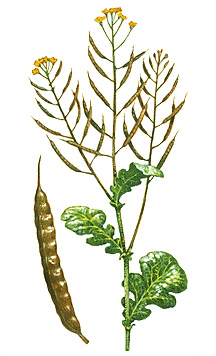Rape is a flowering herb of the mustard family. It is grown commercially in Asia, Canada, Europe, New Zealand, and the United States. Some varieties of rape are called rutabagas in the United States and swedes in Europe. They have an edible turniplike root. Farmers grow other varieties of rape as pasture crops. Varieties called rapeseed are grown for their oilbearing seeds, which are processed into livestock feed, vegetable oil, and industrial lubricants.
Canola is a variety of rapeseed from which canola oil is obtained. Food processing companies use canola oil to make cooking oil and such products as margarine and salad dressings. Canola oil is popular because it is lowest in saturated fat among vegetable oils. Saturated fats seem to increase the amount of cholesterol in blood and thus may contribute to heart disease (see Cholesterol).
The rape plant grows from about 2 to 6 feet (61 to 183 centimeters) tall. It has slender, branched stems with bluish-green leaves. The plant bears pale yellow flowers that are about 1/2 inch (1.3 centimeters) long.

Some varieties of the plant live only one year. Others live for two years.
See also Canola oil.
